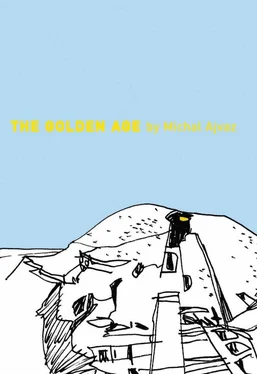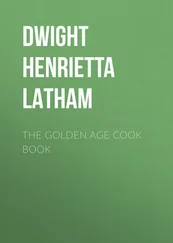Michal Ajvaz - The Golden Age
Здесь есть возможность читать онлайн «Michal Ajvaz - The Golden Age» весь текст электронной книги совершенно бесплатно (целиком полную версию без сокращений). В некоторых случаях можно слушать аудио, скачать через торрент в формате fb2 и присутствует краткое содержание. Год выпуска: 2010, Издательство: Dalkey Archive Press, Жанр: Современная проза, на английском языке. Описание произведения, (предисловие) а так же отзывы посетителей доступны на портале библиотеки ЛибКат.
- Название:The Golden Age
- Автор:
- Издательство:Dalkey Archive Press
- Жанр:
- Год:2010
- ISBN:нет данных
- Рейтинг книги:4 / 5. Голосов: 1
-
Избранное:Добавить в избранное
- Отзывы:
-
Ваша оценка:
- 80
- 1
- 2
- 3
- 4
- 5
The Golden Age: краткое содержание, описание и аннотация
Предлагаем к чтению аннотацию, описание, краткое содержание или предисловие (зависит от того, что написал сам автор книги «The Golden Age»). Если вы не нашли необходимую информацию о книге — напишите в комментариях, мы постараемся отыскать её.
is Michal Ajvaz’s greatest and most ambitious work.
The Golden Age
The Golden Age — читать онлайн бесплатно полную книгу (весь текст) целиком
Ниже представлен текст книги, разбитый по страницам. Система сохранения места последней прочитанной страницы, позволяет с удобством читать онлайн бесплатно книгу «The Golden Age», без необходимости каждый раз заново искать на чём Вы остановились. Поставьте закладку, и сможете в любой момент перейти на страницу, на которой закончили чтение.
Интервал:
Закладка:
While Tana is still unconscious, Taal and Uddo leave the palace and head back to Devel; in all the confusion no one spares them a second thought. As soon as he regains consciousness, Tana sets up a search party for Nau, which scours the palace all night before discovering Nau under the pile of statues by the fountain. It soon becomes apparent that there is no tool in existence that is powerful enough to scratch the coating of red from the marble panel nor any solvent that is effective against it. Tana offers a reward to anyone who can invent such a tool or solvent, yet still he does not lose hope that he will remember the ingredients he was told by the blue light of the medusa. Gradually he calls to mind thirty of them, but of course this is not enough for the creation of the antidote. He wanders the palace oblivious. Before his eyes there are thirteen swirling letters; these summon other letters in an unceasing swarm, forming thousands of real and non-existent words that always disintegrate. One day a fugitive Devel academician arrives on Illim. This scientist has some familiarity with Uddo’s murderous chemistry and is able to give Tana details of a solution guaranteed to dissolve the red coating on the marble panel. The substances needed for the production of the solution prove relatively easy to find, but the liquid becomes active only after a certain red gemstone has been submerged in it for several days. Only one such gemstone is known to be in existence, and sad to say this is in a casket that belongs to Taal.
Silver ball
I am returning to my writings about the island after an interval of two days. Although I do not wish to try your patience, dear reader, I would like to tell you of my experiences since my last dispatch. But perhaps you need to know immediately whether Tana succeeds in stripping the marble panel of its red coat; perhaps you loathe digressions and dislike books that take you in the course of a single paragraph from a Prague apartment to the tropics and a shack made of reeds, or from the calm of the here-and-now to the picturesque court of a despot of ancient times — before, in the very next paragraph, taking you back where you started, as if nothing has happened. If this is true of you, I wish to assure you that I have no intention of bending your will to mine: should you choose to skip the next few pages, I will not hold it against you. Imagine that they are written in the form of a fold-out strip on thin reed-paper which is inserted in a white pocket and which you do not open. You have my word for it that in the chapters to come we shall return to Illim and Tana and Taal. Gato, too, will make an appearance, and as you learn about an expedition to Devel, the fact that you have skipped a few pages will not compromise your understanding of the adventure.
Now that restless readers have moved ahead, back to distant Illim, now that we are rid of the over-eager, I should like to reveal to you — my judicious reader who is in no particular hurry — that the most important aspects of any story reside in its digressions, even when connections between a digression and the main story are impossible to establish. This is one of the things I learned on the island, and I believe it to be true of more than just literature. There is an experiment we can perform to verify this. If you are working towards a particular goal or trying to solve a riddle (big or small), take the first path that leads off the highway you have drawn for yourself; as you continue on this nonsensical, pointless and indefensible diversion, soon you will glimpse the first flashes of the secret that has so far eluded you, the first letters of the inscription that will reveal the target of your ambitions. Only on the marvellous fringes of diversions that lead nowhere — the paths of resignation, curiosity and adventure — will you find chambers of rest, books of secret learning and the woman of your most agonizing nightmare.
So are you sitting comfortably? I shall take my time in describing to you what happened to me in Michle; there is time enough for us to return to the story of the island. And if one chapter should not suffice for my description of the events in Michle, I know you will not be angry with me if I continue it in a second. Who knows, perhaps the Michle insertion will generate a whole host of chapters, even a book within a book. Or perhaps I will tire of the description before I reach the end of the paragraph and take us straight back to Illim. But let us not concern ourselves with that for the time being — there is still some way to go to the end of the paragraph. Let us enjoy the sense of freedom the diversions grant us; let us breathe in their scent, the pure air of the uncontaminated vapours of sense and intent, the atmosphere of the myriad, always-beautiful encounters to come with monsters on the one hand and luminous beings on the other. But perhaps once again you are dubious: didn’t they always tell you that a work of art is a whole? How can a text be a whole when each of its parts grows rampant without consideration for the others? My answer to this is a quotation from a passage of the Book , where the neo-Platonic king Asa answers the complaints of his advisors that he has had the royal palace built to the plans of thirteen architects, each from a different corner of the world, by the “exquisite corpse” method (though each of the architects knew what their colleagues were contributing). “My dear, over-solicitous ministers,” says Asa. “The relations that create the true whole are those which join the ends of the rampant growing parts. The harmony of the subtle tremblings of the last outgrowths of digression suffices to establish a rhythm for the whole. Do you not see that my palace is the best-integrated work of architecture ever known?”
When in the morning of the day before yesterday I was writing about the night-time struggle in the palace on Illim, I forgot all about the pocket of the Book that resembled Uddo’s pouch — which since my return from the island had lain at the bottom of one of the drawers of my desk. I sought it out and studied the sachets of coloured powder it contained. Their scent was so heavy that it soon gave me a headache. I thought about throwing the pocket away, but instead I put it in my bag. I left my apartment around midday; I remembered the pocket as I was crossing the bridge over the Botic in Michle, and I tossed it into the water. There was a sudden fizzing sound followed by the scattering across the surface of concentric circles in silver and violet. The system of circles drifted several dozen metres downstream before converging at a single point, out of which began to rise ribbons of luminous vapour that came together to form a gleaming silver ball about one metre in diameter. Although the ball appeared to be made of a shiny heavy metal, it soon reached the height of a two-storey building; at this point it paused for a few moments before continuing its ascent along the overgrown Pankrác side of the brook and disappearing into the clouds.
I had no idea what to make of this flying metal ball. I was seized by the strange feeling that my stay on the island had taught me nothing. I had assumed that the strangest thing about the island was that it had no secrets at all — that the island’s greatest mystery resided in the absence of any kind of mystery on the island. Now I suspected that for the entire course of my stay the island had been keeping its secrets from me, that the seeming absence of mystery had in fact been an elaborate, deliberate act of concealment. I was not able to place the gleaming ball within the context of anything I had known on the island. As I stood there perplexed on the bridge in Michle, I thought it probable that I had stumbled across an indication of the island’s witchcraft, of whose existence the islanders had kept me in perfect ignorance. I had several times read in magazines about the theory of the Atlantis origin of the island’s culture, and I had always thought it ridiculous. Now I asked myself if these sensationalist articles and books about the legacy of Atlantis might be more truthful accounts than my own more sober one, which was based on unvarnished facts.
Читать дальшеИнтервал:
Закладка:
Похожие книги на «The Golden Age»
Представляем Вашему вниманию похожие книги на «The Golden Age» списком для выбора. Мы отобрали схожую по названию и смыслу литературу в надежде предоставить читателям больше вариантов отыскать новые, интересные, ещё непрочитанные произведения.
Обсуждение, отзывы о книге «The Golden Age» и просто собственные мнения читателей. Оставьте ваши комментарии, напишите, что Вы думаете о произведении, его смысле или главных героях. Укажите что конкретно понравилось, а что нет, и почему Вы так считаете.












